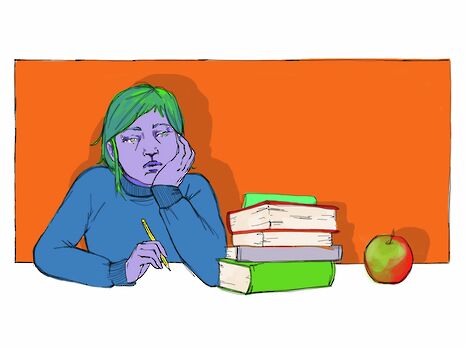Relapse and Recovery
When Cambridge seems at its most intense, strict dietary habits can become a way to re-inject control. Gabrielle McGuinness pens an open and honest piece on the struggles of living with disordered eating

I’ve done a few scary things in my life so far, varying from a tandem sky dive to cycling drunk to braving Danger Spoons, but writing this article is probably the most difficult thing I have ever done. My worrying lack of real self-esteem became a serious problem when I was in secondary school and began to develop an eating disorder. Since starting university, my issues have morphed. Although I learnt to battle it to some extent, it is difficult to shake off old feelings of self-loathing and bad habits.
It has always been my secret. I’ve never been good at team sports but I finally found a game in which I excelled. The players were me, my brain and everyone else, while the rules were to trick others into thinking I was completely fine so I could suffer in a self-inflicted silence. Except for a select few friends and eventually my own mum, it has been seven years of lying about this – which cannot go on any longer.
It began around year nine, when my insecurities overwhelmed me, so I chose to become my own bully. When everything felt beyond comprehension, it was the part of my life I had power over. I got trapped in a cycle in which I became so skilled at deception that I tricked myself into proving the feelings of unworthiness that triggered it all in the first place. Towards the end of sixth form I began to try overcoming these issues but the process is slow: old thoughts often come back to haunt you.
At my worst, achievements were falling asleep with a stomach so empty it echoed or being momentarily overcome with dizziness; the days where I invented a new excuse to skip lunch or managed to disguise the noise of vomiting my unwanted dinner so that my parents couldn’t hear. I have memories of big family Christmas dinners or friends’ birthdays that are marred with the subsequent memory of slipping away to the toilet to purge – at times even taking laxatives. I can reflect back upon a section of my life where I was half-existing: physically present but with my brain totally fixated on the illness.
Eating disorders aren’t about wanting to be skinny; they’re about feeling unworthy in a deeply psychological way. Your brain totally takes control. But it becomes trickier to battle these thoughts when the society around you seems to encourage your feelings of inadequacy. Disordered eating is not exclusive to women but the omnipotence of a largely homogenous and unattainable ideal of female beauty in films, adverts, music videos, porn or even #fitspo Instagram photos make it challenging to grow up as a teenage girl without developing a fraught relationship with food. I went to a competitive all-girls’ grammar school where we weighed ourselves against one another constantly; both grades and appearance were key factors to quantify. I know that my mixed-race identity felt like a constant reminder that I would never be accepted.
Unfortunately, the intense stress of a Cambridge term makes it a breeding ground for disordered eating, and I have met several other people who have experienced similar issues. I eventually learnt that I could not sustain these habits if I also wanted to live happily, healthily and successfully. Or, at least, the rational part of me knows this. But even though I am no longer starving myself, my brain still obsessively tracks and worries about every crumb I swallow every single day.
So it is an oversimplification of the matter to speak of ‘recovery’. Eating a slice of cake does not mean I am ok with myself now; there is still an inner voice I cannot exorcise that chides me for eating breakfast or for not being as thin as I could be. I still cannot look in the mirror without passing severe judgements upon my reflection.
Or, there’s the hypocritical part of me that feels unbelievably guilty for finishing my plate at dinner while simultaneously being in denial about having an eating disorder. Or the fact that I’m having doubts about writing this article, trying to convince myself I’m perfectly healthy and always have been. By keeping it secret for so long, I have held this lucky card close to my chest that I can play as a way to regain some power whenever my insecurities resurface.
I have developed coping strategies over the years to avoid a full relapse, such as planning lunch dates and making sure I frequently regulate feelings of self-hatred. But I do confess that I am guilty of slipping in and out of old habits. When you develop these thought mechanisms so young, being able to program yourself differently feels impossible.

The unavoidably competitive atmosphere in Cambridge is a glaring reminder of those painful school days. Suddenly I’m the 16-year-old me all over again. Some days I rely largely on coffee and cigarettes to sustain me. While I might start the term with the aim of becoming a paradigm of healthy living, everything changes after a week or so when the essays pile up and the array of verbose articles on the reading list seem beyond comprehension. Our courses are constructed in such a way that we are constantly under microscopic examination, through the constant stream of deadlines, the weekly contact with supervisors, and the silent tension between peers in lecture halls. It becomes logical to exchange lunch for a torturous shift in the library.
Starvation seems to balance out perceived underperformance because Cambridge cultivates irrational thought patterns. It’s the same reasoning that says it’s totally justified for someone to stay up all night finishing an essay, proceed to attend their lectures, and then play a few hours of sport in the evening. We set unrealistic expectations for ourselves and so we shackle ourselves to failure from the offset. The result is that some of us are left feeling powerless. Moderating food intake becomes an easy way to regain some semblance of agency.
During low periods at Cambridge, I have told friends I wouldn’t be going to the college buttery as I was cooking my own dinner separately, when really I needed an excuse for skipping the meal and thus sacrificed the social, stress-relieving function of those occasions. I have used an intense day of work or a few extra-curricular commitments in the evening as a way to distract myself from my hunger. I have bought incredibly dull food or barely stocked my cupboards so as to deprive myself of the sorts of foods I actually enjoyed.
Now feels like the right time to open up because I have felt stronger lately than I have for a while. I’m terrified, but by making these problems real and public by putting fingers to keyboard, it transforms it into something that the former me suffered from but that the present me wants to truly leave in the past. After all, the health risks of anorexia include liver damage, osteoporosis, infertility and, in serious cases, death.
I’ve been lucky to avoid these but I feel the effects of it on my digestive system as well as my mental health and wellbeing. Cambridge is a stressful environment in which people develop all sorts of issues such as anxiety, physical self-harm, an alcohol problem, gambling, insomnia or physical conditions. I am guilty more than anyone of being secretive for too long; but I’m a fervent believer that we need to begin a genuine dialogue where we speak freely about our own personal struggles with our mental health without fearing the appearance of weakness, because it reminds us that no one is alone
 Comment / Anti-trans societies won’t make women safer14 November 2025
Comment / Anti-trans societies won’t make women safer14 November 2025 News / Controversial women’s society receives over £13,000 in donations14 November 2025
News / Controversial women’s society receives over £13,000 in donations14 November 2025 News / John’s rakes in £110k in movie moolah14 November 2025
News / John’s rakes in £110k in movie moolah14 November 2025 Fashion / You smell really boring 13 November 2025
Fashion / You smell really boring 13 November 2025 Music / Three underated evensongs you need to visit14 November 2025
Music / Three underated evensongs you need to visit14 November 2025









